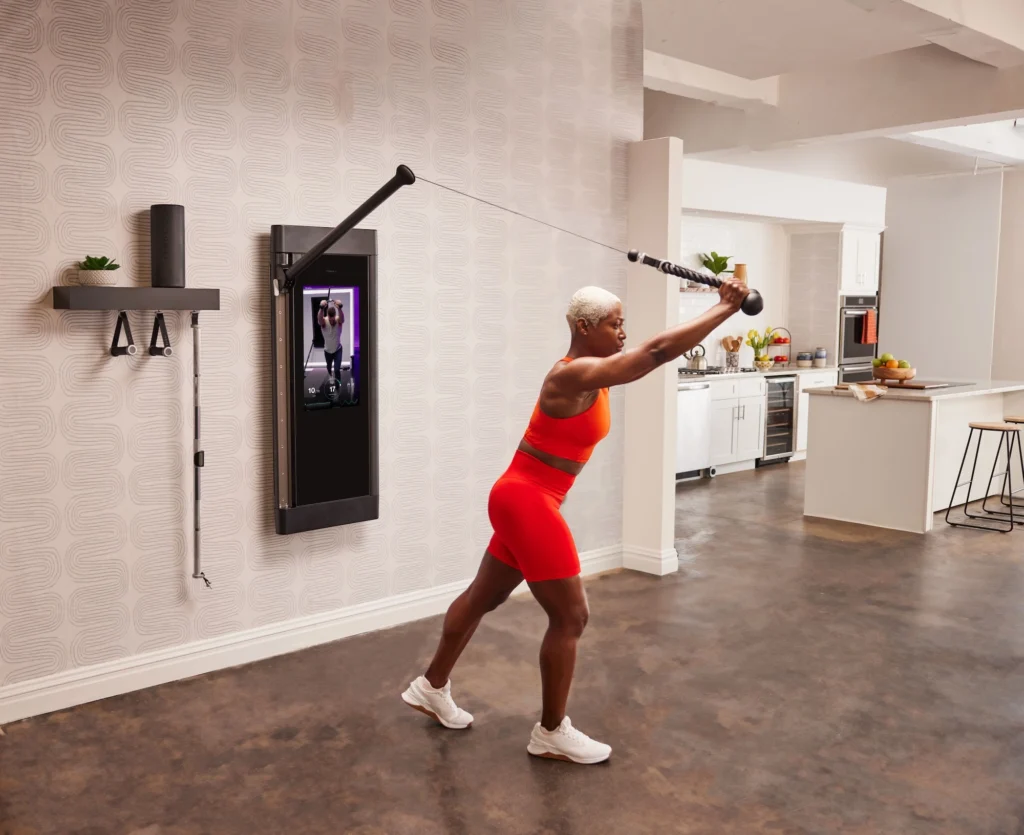For Tonal, AI & Strength Training Are the Keys To Saving At-Home Fitness

The smart home gym company is using the wealth of data it’s amassed on human strength training outcomes to revolutionize how people work out
The at-home fitness market has endured some seismic shifts in recent years. The post-pandemic adoption of hybrid fitness models and the lure of high-value, low-price (HVLP) gyms and community-focused boutique fitness studios have put home fitness brands to the test.
Home-based workouts are undeniably convenient, but beyond that, what will make some at-home fitness companies succeed while others crumble?
If you ask smart home gym maker Tonal, the answer is advancing artificial intelligence (AI), zeroing in on strength training and an emphasis on longevity.
While other at-home fitness brands have experienced shrinking consumer bases, Tonal says its subscriber base continues to grow, with a less than 1% churn rate, leading to over $100 million in annual recurring revenue. Tonal members have lifted a collective 200 billion pounds, according to the company’s 2023 report.
Despite some recent internal headwinds and a generally fraught connected fitness market, the future looks bright for Tonal, which is confident in its ability to revolutionize at-home strength training with proprietary, anonymized datasets and AI.
Earlier this year, the smart home gym maker also announced a large-scale partnership with Spartan Race where race participants must complete a rotational chop on Tonal as part of a required obstacle at all stadium races this year — essentially providing a Tonal demo to over 50,000 racers.
Athletech News spoke to Tonal’s chief product and content Officer, Jonathan Shottan, about the benefits of strength training, how the smart home gym company leverages data to help its members train smarter and a potential retail expansion.
Right, Place, Right Time: The Rise of Strength Training
Strength training has captured the interest of fitness enthusiasts of all ages, especially with mounting evidence that shows the mental and physical benefits of lifting weights and the role it plays in longevity.
“The last decade has seen a secular shift in how strength training is perceived,” Shottan says.
He points to a study that shows strength training reduces the risk of catastrophic injuries among elderly populations and research demonstrating that resistance training can reduce insulin sensitivity among Type 2 diabetes patients and support healthy aging, improved mobility, cognitive function, cancer survivorship and metabolic health.
“It’s no longer just a vanity pastime for the proverbial gym bro,” Shottan adds.

Strength training has been Tonal’s focus since 2018, when the company debuted its high-tech, at-home, strength training system that uses digital weights to serve as an all-in-one workout companion for users.
“No matter what an individual’s goals are, Tonal can assess and then guide that person to their outcome successfully thanks to nearly 200 distinct exercises, multiple weight modes, the highest production-quality guided content and industry-leading artificial intelligence,” he says.
A Different Approach to At-Home Fitness
In general, the at-home fitness sector has struggled post-pandemic as people return to gyms and studios. At the top of its game in 2020, Peloton has notably grappled with a changing at-home fitness landscape in recent years, most recently seeing its CEO depart amid layoffs and buyout speculation.
BowFlex, which rebranded from Nautilus, also fell victim to the at-home fitness bust, declaring bankruptcy and being acquired by Johnson Health Tech, the parent company of Matrix Fitness, as part of the proceedings.
Part of what sets Tonal apart from the pack, Shottan says, is its ability to drive engagement through results — the kind that keeps people going and ensures that their Tonal machine doesn’t end up neglected and covered in dust.
“What Tonal has done right is make strength training at home an engaging and effective experience and one that members stick with over very long periods of time to improve their lives,” Shottan says, adding that data from hundreds of thousands of Tonal members shows that on average, members make 70+% strength gains in their first year on Tonal.
“Even members who joined more than 3 years ago are still working out on Tonal 10-plus times a month,” he shared.
The Power of Data
Although the topic of data collection tends to stir up controversy, it undeniably carries benefits when used by fitness tech companies for the purposes of improving users’ health and longevity.
“There is so much data being collected right now across an entire ecosystem of companies looking to improve human outcomes,” Shottan says. “Glucose monitoring, sleep quality, walking gait assessments—you name it. What Tonal has, which is unique and fully differentiated, is a collection of physiological measurements, all tied to strength outcomes.”

In an interview last fall, Tonal CEO Krystal Zell shared a bit about the smart home gym company’s data-capturing process — which is anonymized but allows the brand to drive insights and propel the member experience.
“The movement, the reps, did you struggle with movement? Did you struggle with the last rep? Did we have to turn on spotter mode and give you a spot? All of this data is completely captured, and we know a lot about you,” Zell told ATN. “It’s not about technology for the sake of technology. It’s all about how we can use this data to get our members better workouts with more results.”
Tonal’s ability to collect detailed data on member movements allows Tonal to do things like create highly personalized workout plans for its users.
“In aggregate now, Tonal has amassed the world’s largest physiological data set tied to human strength,” Shottan says. “And unlike many other companies that capture data, Tonal is in the unique position to provide actionable insights in the same closed-loop system. The more you use the product, the smarter it gets for you personally, and the smarter it gets as a whole.”
Tonal’s vision, according to Shottan, is to provide anyone with the ability to achieve positive results by strength training while in the comfort of their home — and with the same degree of personalization that a human coach would provide.
“Our data and size allow us to do that,” he says.
What’s Next for Tonal
As Tonal focuses on ensuring it has the world’s best hardware, content and AI-powered personalization, the smart home gym maker is planning to release some new features to meet those goals.
One upcoming offering is Training Goal Metrics, which tracks progress in categories such as muscle growth, strength and weight loss and informs a member if they have reached their weekly target or what they need to do to reach it (such as performing a certain number of sets).
A second new innovation, Training Effects, will indicate how much a program or workout will help a Tonal member hit their specific fitness goals. This will allow members to gauge a program’s relevance and make it easy to compare content.
On the product front, Tonal plans to introduce TONi, a digital assistant that incorporates an AI-powered natural language interface and Tonal’s proprietary data. The new feature will allow members to tailor their workouts and enhance their personal training experience.
In addition to the upcoming features, Shottan indicated that the smart home gym maker is considering bolstering its retail presence to bring more people into Tonal’s AI-based strength training world.
“We’re also continuing to evolve the applicability of our product beyond the core strength training modality and into adjacent needs such as mobility to ensure that everyone, no matter where they are in their strength training journey, can get value from Tonal,” Shottan shares.



